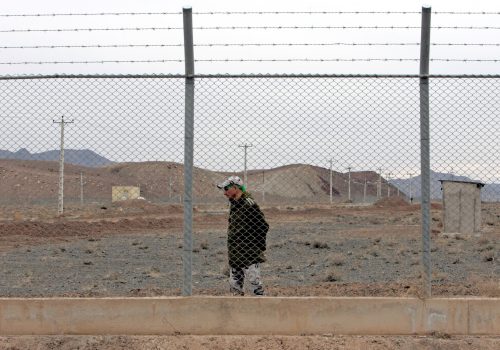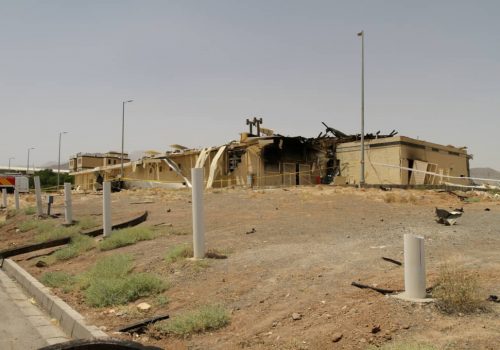Israel and Iran need to turn down the heat. The UAE could be the best choice as conduit.
When the Abraham Accords were unveiled in 2020, Iran denounced the United Arab Emirates’ (UAE) decision to normalize relations with Israel as a dangerous step threatening its security as well as the Palestinians’. Just a day after the agreement was signed, on September 15, 2021, the Iranian foreign ministry condemned the pact as “strategic idiocy” and “a stab by the UAE in the back of Palestinian people.” The Islamic Revolutionary Guard Corps (IRGC) also issued a fiery statement, dubbing the normalization “historic idiocy” that would bring about a “dangerous future” for the UAE leadership.
These statements weren’t surprising given the widespread impression that the Abraham Accords—which later grew to include Bahrain, Sudan, and Morocco—were motivated largely by Arab fear of and animosity toward Iran. Israel’s comments, suggesting it aimed to use the accords as a platform to build a “regional NATO” to deter Tehran, fed this impression and underlined the fact that Israel, Bahrain, Saudi Arabia, and the UAE see Iran as a common enemy and have quietly collaborated for years to prevent Tehran from establishing hegemony in the Persian Gulf and Middle East at large.
However, recent events in the region highlight the need to use the Abraham Accords not only as a stick to threaten Iran, but as a means of defusing tension in the region.
First and foremost, it’s important to remember that the UAE and Israel have fundamentally different relationships with Iran that stems, in part, from their respective regional positions (in addition to the obvious major differences in religion and political systems).
The UAE has had territorial and other disputes with Iran for decades, including Iran’s occupation of three small islands in the Persian Gulf since the days of Shah Mohammad Reza Pahlavi, as well as ongoing differences in Yemen. But the UAE and, particularly Dubai, have also had lucrative economic relations with Tehran. Given the UAE’s status as a global hub for trade, tourism, and investment, the UAE relies on stability and is no longer entirely confident that the United States would come to its aid in the event of a military confrontation with Iran.
Both the UAE and Saudi Arabia have engaged in talks with Tehran following attacks on oil tankers off the coast of the UAE and missile and drone strikes on Saudi Aramco’s Abqaiq oil facility in 2019, which occurred after the Donald Trump administration withdrew from the Iran nuclear deal. On April 28, 2021, Saudi Crown Prince Mohammed bin Salman went so far as to say that the Kingdom is seeking “a good and positive relationship with Iran.”
The UAE’s situation is further complicated by its geography: it’s adjacent to Iran and home to a sizable Iranian community. Far from looking for a confrontation, many Emiratis are concerned that a military conflict could destroy its impressive but fragile infrastructure.
Israel, on the other hand, sees Iran as an imminent existential threat. Apart from conversations between former officials, Israel and Iran have had no overt contact for years and actively oppose each other directly and through proxies.
Unless Iran gets close to a nuclear breakout capability, Israel and the UAE aren’t likely to move against Iran together overtly—the UAE has too much to lose. But the Emirates could help defuse tension with Iran at a time when Israeli military activity in Syria continues against Iran.
Recent events concerning tensions between Iran and Israel only sharpen the need to create a communication channel between the parties to prevent escalation. The March 7 killing of two members of the IRGC, which has been attributed to Israel, and reports of an alleged Israeli attack on a drones factory run by the Islamic Revolutionary Guards Corps near Kermanshah in February, together with the Iranian response—which included the firing of missiles at what Tehran alleges was a Mossad base in Iraqi Kurdistan, in addition to a cyber-attack on Israeli government sites on March 14—may bring the parties closer to an armed confrontation than in any other point in their history.
The UAE could help avoid escalation by establishing a “hotline” to reduce the risk of miscalculations that lead to war. This could be especially useful at a time when Russia, which might have served such a role in the past, is preoccupied with the war in Ukraine and its consequences.
In recent months, there has been a dramatic change when it comes to diplomatic relations and connections among some Middle Eastern countries. From a situation in which most countries didn’t talk to Israel or often even each other, there are new connections and a re-evaluation of the role of the United States.
Israel, lacking any overt channel of communication with the leadership in Tehran, has been left with the “language” of drones and missiles, with the danger that the “war between the wars” could escalate into the real thing. A new indirect channel is needed to help prevent this.
The relationship that Israel has managed to build with Hamas in the Gaza Strip—through Egypt as mediator—is an example of such a relationship. Although Hamas rejects Israel’s right to exist and Israel sees Hamas as a terrorist organization, the Egyptian channel has sometimes made it possible to prevent and contain conflict.
The United States, which also lacks relations with Iran, has previously used Qatar, Oman, and the Vienna process to facilitate discreet dialogue with Tehran. Despite the common perception that the Abraham Accords is anti-Iran, there are constructive ways to use new relationships in the region to keep the present, uneasy peace. Arab Gulf countries should create a communication channel between Israel and Iran. It will not be easy, but it could keep hostility from triggering a regional war.
Danny Citrinowicz served for twenty-five years in a variety of command positions units in Israel Defense Intelligence (IDI) including as the head of the Iran branch in the Research and Analysis Division (RAD) in the Israeli defense intelligence and as the division’s representative in the United States. Follow him on Twitter: @citrinowicz.
Further reading
Wed, Sep 1, 2021
An escalating Israel-Iran conflict could sink the JCPOA
IranSource By
Rising tensions between Israel and Iran have reached an alarming stage in recent weeks. What used to be a shadow war of covert operations, sabotage, and proxy conflict is turning into a more direct military confrontation between the long-time regional adversaries.
Mon, Dec 20, 2021
I once headed the Iran branch of Israel’s military intelligence research. Here’s why Israel can’t take out Iran’s nuclear program.
IranSource By
Besides the operational challenges in executing such a military attack, especially given Iranian forces’ buildup of surface-to-air units, there are other more strategic challenges facing Israel.
Fri, Jul 10, 2020
A series of unusual events in Iran point to sabotage. How will Tehran respond?
IranSource By Borzou Daragahi
A spate of explosions has struck highly secure and sensitive sites, as well as regular industrial locales, including factories and gas pipelines, and even a clinic in a fancy part of north Tehran.
Image: Prime Minister Naftali Bennett is received by Abu Dhabi Crown Prince Sheikh Mohammed bin Zayed al-Nahyan at his private palace in Abu Dhabi, United Arab Emirates December 13, 2021. Haim Zach/Government Press Office (GPO)/Handout via REUTERS.


